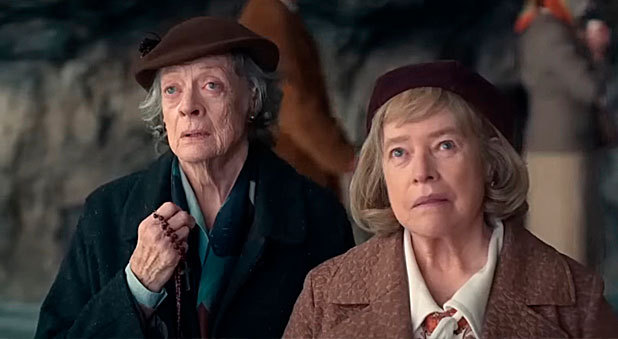The Miracle Club
Rated PG
Some coarse language
Who are we in the place that no one sees (well, no one but ourselves and God)?
When we’re honest, we know that what lurks there are decisions we should not have made, words we should not have said, and people we have hurt. We know we are flawed, yet all too often we live as though this is only an issue for others. And we judge others by a standard we ourselves cannot reach. This is essentially the backstory of The Miracle Club.
Set in 1960s Dublin, it begins with three women preparing to perform in a community talent show, where tickets for the parish’s bus trip to Lourdes are offered as first prize. Elderly Lily (Maggie Smith) has always wanted to visit the Catholic pilgrimage site but we’re not really sure why. Eileen (Kathy Bates) has a lump in her breast she’s told no one about and hopes for a miracle cure; young mum Dolly (Agnes O’Casey) wants a cure for her son Daniel, who seems unable to speak.
While past regret and present trouble are often papered over with gentle humour, the return to the community of Eileen’s younger cousin Chrissie (Laura Linney) during the show is akin to a bomb going off. She has come back from the US on the death of her mother, and an angry Lily and Eileen all but ignore her, to Dolly’s confusion.
Chrissie is poised and reserved amid their disdain, but Linney’s face shows the hurt as she begins to confront the ghosts of her past. What has she done? Why has she stayed away for so long? There is clearly unfinished business here, so it’s no surprise when all four of the women end up on the bus, with Daniel and other pilgrims, on their way to Lourdes together.
For the three who haven’t travelled, excitement at their adventure away from a housewife’s daily life gives way to surprise at the “business” of Lourdes. “I didn’t expect all this selling,” says Dolly, as she looks through a gift shop with Eileen – who adds that she “thought Jesus didn’t want all that”. She’s dead right, of course... but they still buy the souvenirs.
In their own way, each of the women is adrift on an ocean of regret and unforgiveness, which time together and their differing experiences of the place bring to light. Each has a story to tell, and each fears judgement – either from God or from others. Could anyone understand? Could anyone forgive?
One of the most telling observations is made by the kindly parish priest who leads them on the pilgrimage: “You don’t come to Lourdes for a miracle... you come for the strength to go on when there is no miracle”.
But perhaps, for these women, there is a miracle of a different kind – that of forgiveness and restoration of relationship. That this will be the trajectory of the story is pretty clear early on, so mentioning it is no spoiler. However, it’s the way The Miracle Club takes you on this journey that you will enjoy the most.
The film’s real drama is internal and reflective. There are no explosions, no car chases, no gun fights – not even a proper shouting match, although everyone has a great deal to say – and watching three powerhouse women of cinema navigate this together is a rare treat. Maggie Smith just gets better with age, and her interactions with Linney are particularly poignant.
Perhaps Eileen, Lily, Dolly and Chrissie haven’t fully understood the forgiveness and peace of a repentant sinner at the foot of the cross, but you can see a taste of it in the joy they experience when their burdens are lifted from them. Expect to laugh, be filled with compassion and shed a tear or two along with them as, together, they make their pilgrimage of discovery.






















